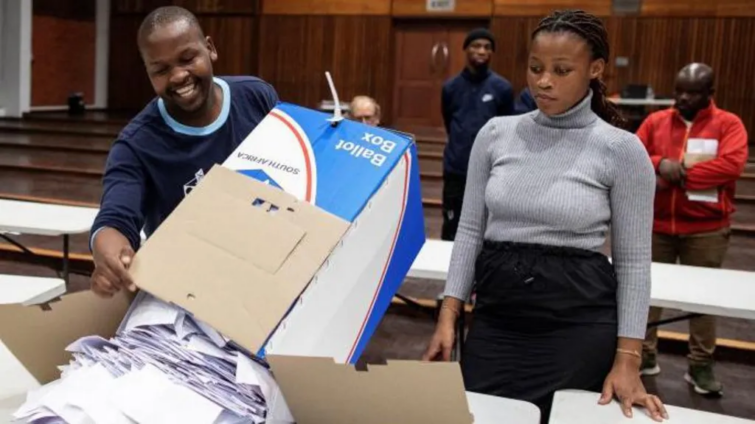South Africa's ruling party, the African National Congress (ANC), is on course to lose its majority in parliament for the first time since it came to power 30 years ago, partial results from Thursday's parliamentary election suggest.
With results from around 43% voting districts counted so far, the ANC is leading with 43%, followed by the Democratic Alliance (DA) with 24%.
Both the radical Economic Freedom Fighters (EFF) and the uMkhonto weSizwe Party (MK Party) of former President Jacob Zuma are on around 10%.
Final results are expected over the weekend.
Many voters blame the ANC for the high levels of corruption, crime and unemployment in the country.
The respected Council for Scientific and Industrial Research (CSIR) and the News24 website have projected that the party's final vote could be around 42%, a big drop from the 57% it obtained in the 2019 election.
This would force it go into a coalition with one or more of the other parties in order to form a majority in parliament.
The DA has liberal economic policies, while both the EFF and MK favour more state intervention and nationalisation, so the choice of partner would make a huge difference to South Africa's future direction.
It is unclear whether President Cyril Ramaphosa will remain in power, as he could come under pressure from the ANC to resign if the party gets less than 45% of the final vote, said Prof William Gumede, chairman of the non-profit Democracy Works Foundation.
"The ANC could turn him into a scapegoat, and a faction within the party could push for him to be replaced by his deputy, Paul Mashatile. The EFF and MK are also likely to demand his resignation before agreeing to any coalition with the ANC," Prof Gumede told the BBC.
South Africans do not directly vote for a president. Instead they vote for members of parliament who will then go on to elect the president.
According to the electoral commission, the last polling station closed at 0300 on Thursday morning local time.
One electoral official in Johannesburg told the BBC the queues were reminiscent of the historic 1994 election, when black people could vote for the first time.
Sifiso Buthelezi, who voted in Johannesburg's Joubert Park - the biggest polling station in South Africa - told the BBC: "Freedom is great but we need to tackle corruption."
Change has been a recurring sentiment, especially among young voters.
"The turnout amongst them was high, and they voted against the ANC," Prof Gumede said.
Ayanda Hlekwane, one of South Africa's "born-free" generation, meaning he was born after 1994, said despite having three degrees he still did not have a job.
“I’m working on my PhD proposal so that I go back to study in case I don’t get a job,” he tells the BBC in Durban.
But Mr Hlekwane said he was optimistic that things would change.
Support for the ANC is expected to be higher among the older generation.
One 89-year-old woman, Elayne Dykman, told the BBC she hoped that young people in South Africa did not take their vote for granted.
According to the electoral commission, the last polling station closed at 0300 on Thursday morning local time.
One electoral official in Johannesburg told the BBC the queues were reminiscent of the historic 1994 election, when black people could vote for the first time.
Sifiso Buthelezi, who voted in Johannesburg's Joubert Park - the biggest polling station in South Africa - told the BBC: "Freedom is great but we need to tackle corruption."
Change has been a recurring sentiment, especially among young voters.
"The turnout amongst them was high, and they voted against the ANC," Prof Gumede said.
Ayanda Hlekwane, one of South Africa's "born-free" generation, meaning he was born after 1994, said despite having three degrees he still did not have a job.
“I’m working on my PhD proposal so that I go back to study in case I don’t get a job,” he tells the BBC in Durban.
But Mr Hlekwane said he was optimistic that things would change.
Support for the ANC is expected to be higher among the older generation.
One 89-year-old woman, Elayne Dykman, told the BBC she hoped that young people in South Africa did not take their vote for granted.
Latest Stories
-
Asantehene receives more 19th century gold ornament and regalia
6 mins -
Hohoe Ghana Blind Union organises training for members ahead of Election 2024
13 mins -
Alan Kyerematen reveals his future plans for Ghanaian Health professionals
14 mins -
AAIN empowers women and small enterprises in Upper East Region through SHINE project
15 mins -
Akufo-Addo leads nationwide commissioning of 80 educational projects
21 mins -
Ghana and Seychelles strengthen bilateral ties with focus on key sectors
52 mins -
National Elections Security Taskforce meets political party heads ahead of December elections
55 mins -
Samsung’s AI-powered innovations honored by Consumer Technology Association
1 hour -
Fugitive Zambian MP arrested in Zimbabwe – minister
2 hours -
Town council in Canada at standstill over refusal to take King’s oath
2 hours -
Trump picks Pam Bondi as attorney general after Matt Gaetz withdraws
2 hours -
Providing quality seeds to farmers is first step towards achieving food security in Ghana
2 hours -
Thousands of PayPal customers report brief outage
2 hours -
Gary Gensler to leave role as SEC chairman
2 hours -
Contraceptive pills recalled in South Africa after mix-up
3 hours

